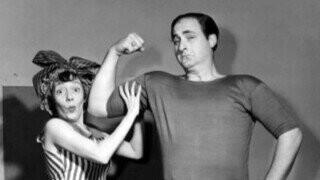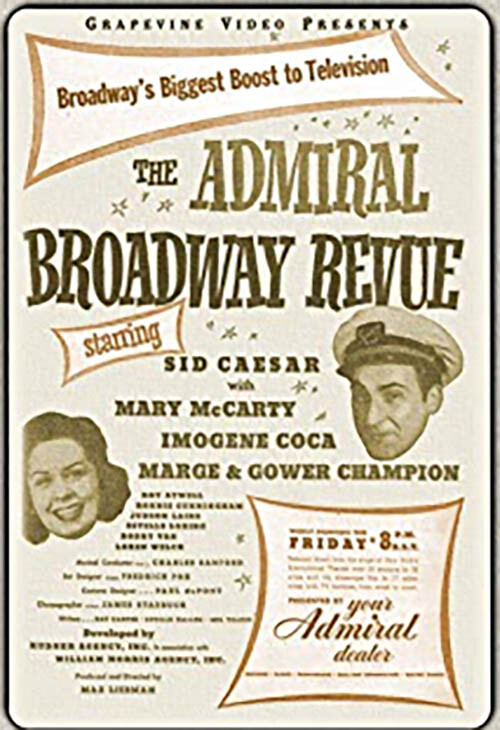Before 'Saturday Night Live,' There Was 'Your Show Of Shows'

Welcome to ComedyNerd, Cracked's daily comedy superstore. For more ComedyNerd content, and blurry black-and-white coverage of the Iran/Contra Affair, please sign up for the ComedyNerd newsletter below.
Don't Miss
It feels like Saturday Night Live has been around forever. 47 seasons of 90-minute episodes make up pure TV history, as comedy’s biggest stars from John Belushi to Chris Rock to Tina Fey emerged from the perennial petri dish to shape the landscape of American humor for good. But what if I told you that SNL wasn’t the first of its kind?

YouTube
One fateful Saturday night on the advent of the golden age of television, a live 90-minute variety show ran on NBC. The program featured music acts, elaborately constructed sets, and hastily written sketch comedy showcasing the unique talents of a unique cast. If a five-year-old Lorne Michaels turned on whatever the Canadian equivalent of television was on February 25th, 1950, and somehow tuned it to an American station, he could have seen the prototype for Saturday Night Live in the form of Sid Caesar’s legendary Your Show Of Shows.
Sid Caesar was one of the earliest and most influential pioneers in the fledgling medium of television. Between Your Show of Shows and its successor Caesar’s Hour, he launched the careers of comedy titans such as Carl Reiner, Mel Brooks, Larry Gelbart, Neil Simon, and Woody Allen. Sid was the original comedy kingmaker some twenty-five years before Lorne Michaels would launch TV’s most prolific late-night variety show. His shows were the mountaintop that all comedy writers aspired to reach. Caesar even invented the concept of “the writers' room,” playing maestro for the bombastic, eclectic, and exclusively Jewish symphony of the greatest comedy writers of the 20th century.
Without Sid Caesar, there would be no “More Cowbell,” no Matt Foley, no “Celebrity Jeopardy,” no “Schweddy Balls,” and no SNL. Sid Caesar championed the variety sketch show format before most homes even had televisions, and all those who came after him owe him a debt.
Sid Caesar walked so David S. Pumpkins could run.
Texaco Star Theater
It’s safe to say that most Cracked readers were not around before televisions became a ubiquitous household fixture. Well, it didn’t happen overnight. In fact, the majority of homes in the US did not have a television set until 1955, one year after Your Show Of Shows concluded. Up until that point, the only in-home entertainment that didn’t require talking to your family was the radio, so naturally, it was radio stations that influenced the earliest broadcast television programs.
The TV shows that took their cues from radio were … pretty much just the same radio shows they had been doing for decades, but with– you know— cameras. Most notable among the bunch was Milton Berle’s Texaco Star Theater, a vaudeville-style variety show where music and comedy acts took turns in the spotlight and regaled the new TV-owning audiences through their magical 12-inch screens.
That's where Sid Caesar made his small screen debut, not as a comic, not as a musician, but as an entirely new kind of performer: a sketch comedian. He acted out entire scenes switching between characters and weaving a narrative into his act that wasn’t typical for a vaudeville radio performer.
His unique performances caught the eye of Pat Weaver, vice president of television for NBC, who introduced him to the two people who would become his closest partners: Max Liebman and Imogene Coca.
Imogene became his onscreen counterpart while Max Liebman played the role of a proto-Lorne Michaels, directing and influencing behind the scenes as Caesar and Coca built their popularity.
Too Funny, Too Fast

Amazon
TV shows can get canceled for all sorts of reasons, but if you asked the average layperson nowadays to write a list of a show's cancellable offenses, I’m willing to bet “being too successful” would be the last possible entry, right after “not enough ferrets” and “it’s just a picture of a sandwich.”
Admiral Broadway Revue was Caesar, Coca, and Liebman's first attempt at producing a television show. Their sponsor was both a television producer and a Television Producer– Admiral Appliances manufactured television sets and funded the programs on the airwaves, a nifty little piece of vertical integration.
However, Admiral was completely unprepared for Admiral Broadway Revue's overwhelming popularity, and it was quickly overrun with orders for televisions. Manufacturing could not keep up with demand, so Admiral made the brilliant decision that, instead of building another factory, it would cancel the hit show and hope that people would stop wanting to buy its products.
Yes, in Sid Caesar’s time, the television industry was so stupid that they would actually fire you for making them too much money.
Saturday Night Review
NBC took notice of Caesar’s success, and it wasn’t long before he and his team got another shot at a television program. In 1950, NBC introduced Your Show of Shows as the second part of their umbrella program Saturday Night Review. It was on this program that Caesar assembled the Avengers of 1950’s comedy, with Carl Reiner, Mel Brooks, Neil Simon, and more joining forces to create an extravagant spectacle that would dominate the airwaves for four seasons.
The format should be pretty familiar to anyone who’s seen SNL: 90 minutes of comedy sketches, including host monologues, pop culture satires, and musical acts to round out the evening.
But what made Your Show of Shows special was the immense creative firepower generated by its incredibly gifted writers. Said Billy Crystal about Sid Caesar’s writing team: “These guys are the greatest collection of comedy minds in one room since Charlie Chaplin died alone.”
Sid Caesar assembled his comedic Knights of the Round Table in the first instance of a modern writers' room. Someone would throw out a pitch, and Sid served as moderator as the group bounced jokes off each other, fleshing out dialogue and inserting their own gags wherever they could. Sid played a proper Caesar, giving thumbs up to jokes that made it and thumbs down to the gags that died in the writers' room. The most literate among the writers was given the typewriter and tasked with the responsibility of creating something resembling a coherent script while Mel Brooks bounced off the walls and Carl Reiner cackled like a hyena.
That writers' room invented the language of television comedy out of nothing but vaudeville and radio, forming the groundwork not just for SNL, but for all TV.
The Split
As the saying goes in 1950’s television, “if it ain’t broke, break it for no reason.” In 1954, Your Show of Shows was canceled with the intention of splitting up Sid Caesar and Imogene Coca so they could each have their own show. Caesar went on to create Caesar’s Hour, a 60-minute sketch show with double the budget of Your Show of Shows and even more writing talent – among the additions to the writing team were Woody Allen and Larry Gelbart, a man who would go on to make a moderately successful TV show called M*A*S*H.
With an inflated budget and greater ambitions, Caesar’s Hour was more daring and risky than its predecessors, experimenting with form and style in a way that wasn’t possible before. Sketches ran for as long as thirty minutes, and elaborate musical numbers were more prominently featured.
The Legacy
Like SNL, Sid Caesar’s biggest cultural impact wasn't necessarily his shows but the careers of those to whom Sid gave a voice and an opportunity. Mel Brooks went on to take the film industry by storm, Carl Reiner continued his success on television, Neil Simon dominated the theater for decades, and Woody Allen built a reputation as one of the greatest comedic filmmakers of all time before smashing it to bits.
As Neil Simon said, “None of Caesar’s writers could have gone on to do what they’ve done, had they not had the experience of working for Sid Caesar.” Sid Caesar was an immensely gifted performer, but his greatest gift of all was his eye for talent. Just as Lorne Michaels would do for nearly 50 years, Sid found the greatest comedic voices available and created an environment where they could grow, learn, laugh, and expand their talents.
Sid Caesar maintained the adoration of his contemporaries throughout his long life, occasionally reuniting to reignite the spark they created many years ago.
The landscape of television would look very different had Sid Caesar not set the market for TV sets ablaze in 1949. The television variety show he invented paved the way for SNL to make its ongoing 47-year run. The language of television and comedy was fashioned in those writers’ rooms, and if you look closely enough, you’ll see Caesar’s fingerprints all over not just SNL, but television itself.
Hail Sid Caesar!
For more ComedyNerd, be sure to check out:
Chris Farley And The Comedian Who Ignited America’s First Sex Scandal
Jerry Seinfeld vs. George Carlin: The Case for Cursing in Comedy
